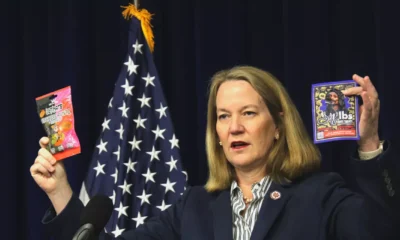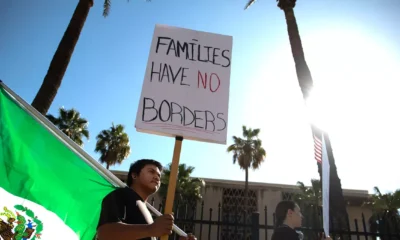AHCCCS
Arizona’s Aggressive Medicaid Fraud Purge Hits Native Americans, Leaving Vulnerable Patients Stranded

Before her fifth birthday, Rainy endured significant trauma, witnessing violence at home as an infant. After child welfare authorities intervened, her parents were incarcerated, leading to night terrors and the devastating loss of her great uncle, who had been a father figure.
Rainy, now 7, only began speaking near her fifth birthday. Separation from her adoptive mother, Lisa Enas, often prompted panic attacks, while reminders of her great uncle’s death left her devastated. Fortunately, through counseling, she found joy and independence, joining her school’s gifted program. The environment in the Gila River Indian Community, adorned with family photos and stuffed animals, provided stability.
However, Rainy’s progress was abruptly interrupted last October amid a large-scale Medicaid fraud scandal that severely impacted the behavioral health services available to her and many Native Americans in Arizona. Authorities uncovered a scheme wherein individuals were lured into fictitious substance abuse treatment programs, costing the state an estimated $2.5 billion since 2019.
In response, the Arizona Health Care Cost Containment System (AHCCCS) canceled contracts with numerous facilities and suspended Medicaid reimbursements, including for Desert Rain Behavioral Health Services. This clinic had been treating Rainy and over 260 other patients reliant on Medicaid.
AHCCCS accused Desert Rain of overbilling and lacking the appropriate licenses to treat children. Although the clinic eventually resolved these issues, the operational disruption hindered patient care.
When AHCCCS began its investigation, it asserted that protecting patients was its top priority. Yet, many patients lost critical behavioral health services as investigations unfolded. The agency implied that providers were responsible for ensuring continuity of care, despite halting reimbursements. This led some facilities to close, curtail services, or use personal funds to provide care.
To assist displaced patients, AHCCCS established a hotline to help connect them with treatment resources. However, its effectiveness stirred disappointment, evidenced by the fact that after six months, the agency stopped tracking the outcomes for most callers. Of the 11,400 who reached out, only 150 requested referrals for behavioral health services. Sadly, more than 575 individuals ended up homeless.
Marcus Johnson, deputy director of community engagement for AHCCCS, stated outreach efforts were made to inform patients of available assistance. Still, many remained unaware of the hotline or lacked necessary communication tools.
Enas, Rainy’s adoptive mother, shared that she never received any notification about the hotline as she sought help for her daughter. Despite the ongoing challenges, 30 behavioral health providers accused of fraud have since been allowed to resume Medicaid reimbursements, yet the struggles for providers and patients alike persist.
Desert Rain was cleared to receive Medicaid payments again after addressing earlier accusations. However, Alexis James, the clinic’s owner, reported that since then, the state has denied her claims. As operating costs continue to rise, many facilities struggle to meet the needs of their patients, particularly from Indigenous communities.
As Enas observed Rainy’s regression without counseling, she expressed deep concern for her daughter’s well-being. Once bright and talkative, Rainy now experiences sharper mood swings, her unresolved grief reemerging more frequently.
Efforts to manage Rainy’s mental health crisis have proven daunting for Enas. After pausing therapy due to financial constraints, Rainy has been unable to access consistent counseling. Many facilities previously treating Indigenous patients have either shut down or stopped accepting new patients, forcing families like Rainy’s to navigate an increasingly precarious situation.
State officials had been warned that suspending behavioral health payments could lead to a surge in homelessness. Advocates have since mobilized to provide support for affected individuals, yet those in need often find themselves without adequate resources or treatment options.
As Raquel Moody, a patient with experience in struggling with addiction, attests, many individuals fall victim to fraudulent treatment facilities. Patients must contend with operators vowing help but providing no real treatment. The fallout from the abrupt changes in Medicaid management has left communities grappling with increased trauma and instability.
Looking ahead, James faces ongoing challenges with minimal state support for her clinic. For multiple families, including Enas and Rainy, the future remains uncertain amid the concerning lack of resources directed towards ensuring mental health care for vulnerable populations.

















